Ukraine war: Will Putin use nuclear weapons?
Russian president has repeatedly pledged to use all means at his disposal to keep his country safe.
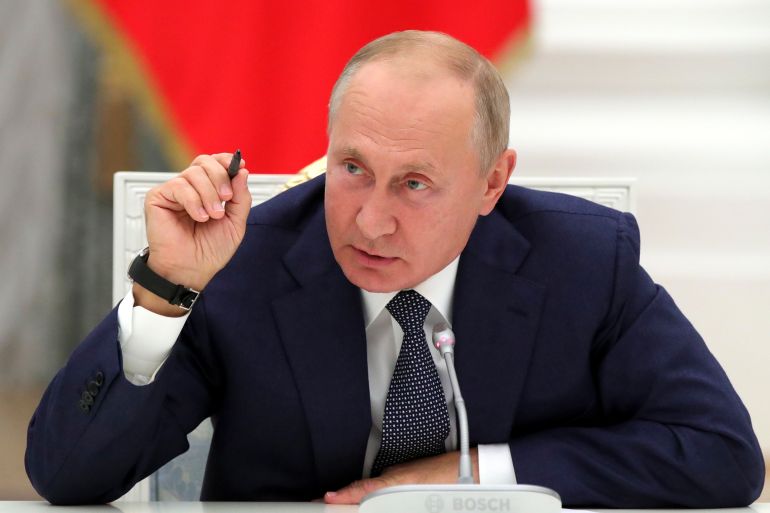
Vladimir Putin, who controls the world’s largest nuclear arsenal, pledged last week to use “all the powers and means at our disposal” to defend Russia. The United States, he said, had set “a precedent” when it dropped two atomic bombs on the Japanese cities of Hiroshima and Nagasaki in 1945.
It was Putin’s latest thinly veiled nuclear threat to Ukraine and its Western allies since he sent Russian troops into the neighbouring country more than seven months ago.
Keep reading
list of 4 itemsChechnya’s leader to send teenage sons to fight in Ukraine
Ukrainian forces advance southward, mirroring success in the east
‘Constant lying’: Pro-Kremlin figures lament the loss of Lyman
But will the Russian leader use nuclear weapons? What would be the impact of such a move? And how might the US respond? As tensions ratchet up, here are key questions answered:
Who has the most nuclear weapons?
Russia is the world’s biggest nuclear power based on the number of nuclear warheads. It has an estimated 5,977 while the US has 5,428, according to the Federation of American Scientists.
Those figures include stockpiled and retired warheads, but both Russia and the US have enough firepower to destroy the world many times over. While Russia and the US have dismantled thousands of their retired warheads, they still have 90 percent of the world’s total nuclear weapons.
Russia has 1,458 strategic nuclear warheads deployed – or ready to fire – and the US has 1,389 deployed, according to the latest publicly declared data. These warheads are on intercontinental ballistic missiles, ballistic missiles on submarines and strategic bombers.
When it comes to tactical nuclear weapons, Russia has about 10 times the number the US has. About half of the 200 US tactical nuclear weapons are deployed at bases in Europe.
US tactical nuclear weapons have adjustable yields of 0.3 to 170 kilotons. (The atomic bomb dropped on Hiroshima was equivalent to about 15 kilotons.)
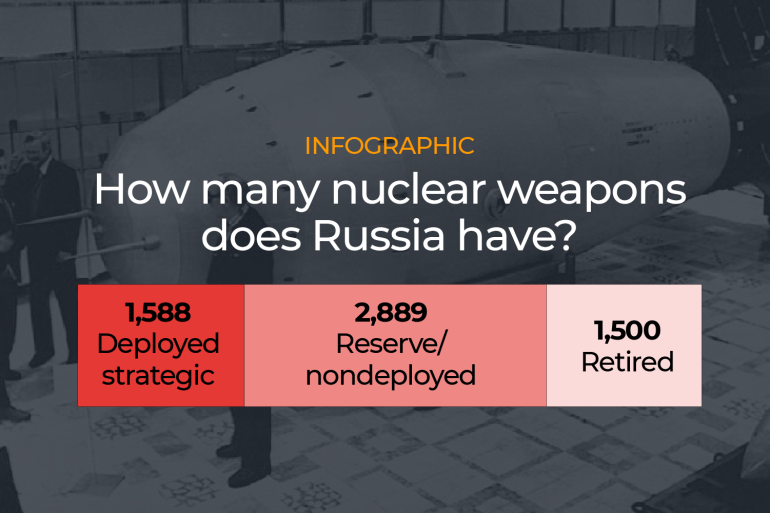
What nuclear weapons could be used?
No Russian official has called for a strategic nuclear weapons attack using the weapons that were designed to destroy cities in the US, Europe and Asia.
Ramzan Kadyrov, head of Russia’s Chechnya region, said recently that Moscow should consider using a low-yield tactical nuclear weapon in Ukraine.
The Kremlin dismissed his call. “This is a very emotional moment,” spokesman Dmitry Peskov said. “The heads of regions have the right to express their point of view. Even at difficult moments, emotions should still be excluded from any assessments.”
Tactical nuclear weapons are essentially nuclear weapons used on the battlefield for a “tactical” purpose. They are much less powerful than the big bombs that would be needed to destroy large cities such as Moscow, Washington or London.
Such weapons can be mounted on missiles and fired from the ground, ships or submarines. They can also be dropped from planes or detonated by ground forces.
Long-range nuclear weapons that Russia could use in a direct conflict with the US are battle-ready. But its stocks of warheads for shorter ranges – so-called tactical weapons – are not, analysts said.
“All those weapons are in storage,” Pavel Podvig, a senior researcher who specialises in nuclear weapons at the United Nations’ disarmament think-tank in Geneva, told The Associated Press news agency.
“You need to take them out of the bunker, load them on trucks” and then marry them with missiles or other delivery systems, he said. Russia has not released a full inventory of its tactical nuclear weapons or their capabilities.
Putin could order a smaller tactical nuclear weapon be surreptitiously readied and teed up for surprise use. But overtly removing weapons from storage is also a tactic the Russian president could employ to raise pressure without using them.
He would expect US satellites to spot the activity and perhaps hope that baring his nuclear teeth might scare Western powers into dialing back support for Ukraine, some analysts said.
“That’s very much what the Russians would be gambling on, that each escalation provides the other side with both a threat but (also) an offramp to negotiate with Russia,” researcher Sidharth Kaushal told AP. He’s a researcher with the Royal United Services Institute in London, which specialises in defence and security.
Although Russia has specialised forces trained to fight on a nuclear battlefield, it is unclear how its army of regular troops, mercenaries, drafted reservists and local militias would cope.
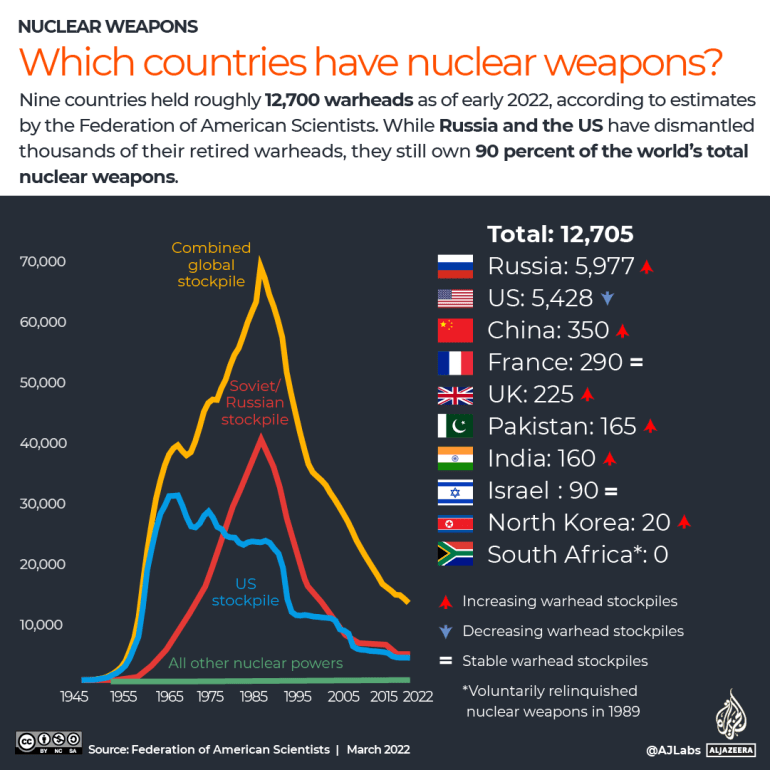
Will Putin go nuclear?
Putin’s reaction will depend on how he perceives the threat to the Russian state and his rule.
The Russian leader casts the war in Ukraine as an existential battle between Russia and the West, which he says wants to destroy his country and grab control of its vast natural resources.
Putin warned the West he was not lying when he said he was ready to use nuclear weapons to defend Russia. Some analysts say Putin is bluffing, but Washington is taking Putin seriously.
Since claiming 18 percent of Ukraine as part of Russia, the nuclear threat has increased because Putin could cast any attack on these territories as an attack on Russia itself.
Russia’s nuclear doctrine allows for a nuclear attack after “aggression against the Russian Federation with conventional weapons when the very existence of the state is threatened”.
But there are also reasons for Putin to decide against a nuclear attack. Many Russians live in Ukrainian territory that Putin has proclaimed as part of Russia, and breaking the post-World War II nuclear taboo would not necessarily change the tactical situation on the ground.
“He is bluffing right now,” Yuri Fyodorov, a military analyst based in Prague, told the Reuters news agency. “But what will happen in a week or a month from now is difficult to say – when he understands the war is lost.”
Asked if Putin was moving towards a nuclear attack, CIA Director William Burns told the CBS television network: “We have to take very seriously his kind of threats, given everything that’s at stake.”
Burns, though, said US intelligence had no “practical evidence” that Putin was moving towards using tactical nuclear weapons any time soon.
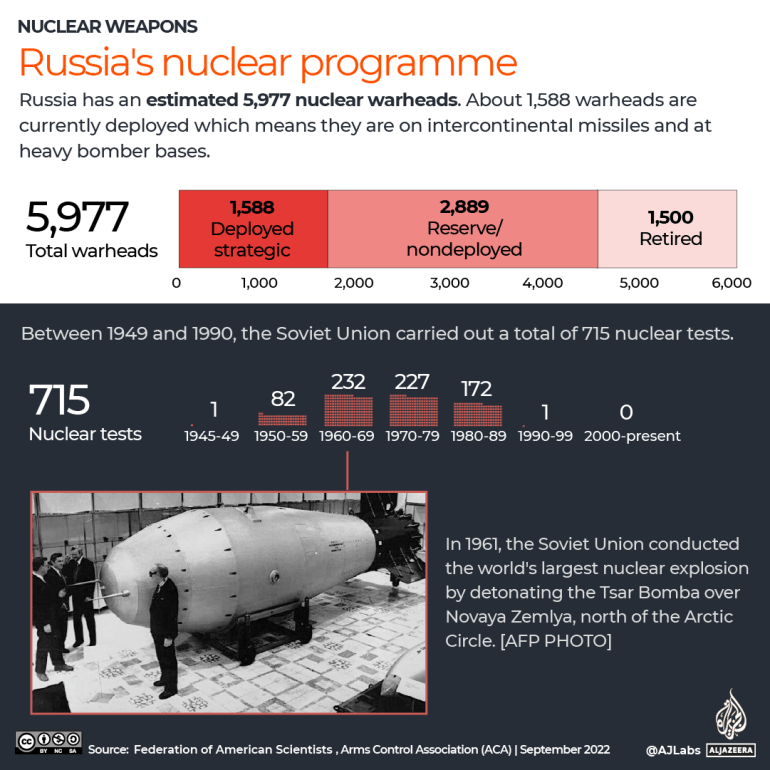
What would the US do?
The White House has warned of “catastrophic consequences for Russia” if Putin goes nuclear.
President Joe Biden’s options would include ordering a non-military response, responding with another nuclear strike that would risk escalation, and responding with a conventional attack that could involve the US in a direct war with Russia.
Retired General and former CIA chief David Petraeus said that if Moscow used nuclear weapons, the US and its NATO allies would destroy Russian troops and equipment in Ukraine and sink its entire Black Sea fleet.
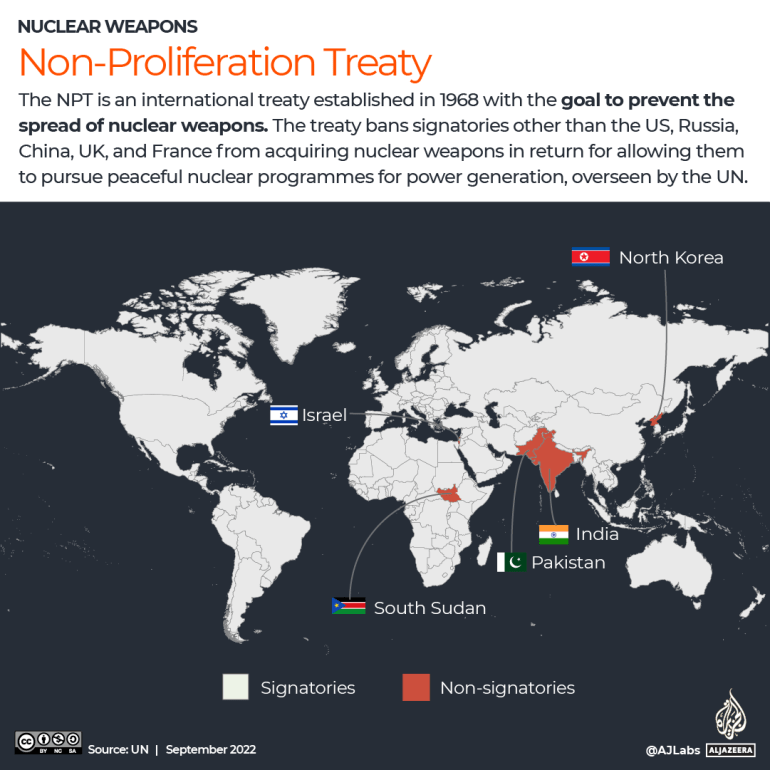
Would nuclear force help reverse Russia’s military losses?
Kremlin watchers are unsure whether a nuclear strike would help Russia on the battlefield, in part because they do not see how it could help reverse Russia’s recent military losses in Ukraine.
Ukrainian troops are not using large concentrations of tanks to wrest back ground, and fighting is sometimes for places as small as villages. So what targets could Russian nuclear forces choose that would have a significant effect?
“Nuclear weapons are not a magic wand,” said Andrey Baklitskiy, a senior researcher specialising in nuclear risk at the UN’s Institute for Disarmament Research. “They are not something that you just employ and they solve all your problems.”
Analysts are struggling to identify battlefield targets that would be worth the huge price Putin would pay internationally. If one nuclear strike did not stop Ukrainian advances, would he then attack again and again?
Podvig noted the war does not have “large concentrations of troops” to target. Striking cities in the hope of shocking Ukraine into surrender would be an awful alternative.
“The decision to kill tens and hundreds of thousands of people in cold blood, that’s a tough decision,” he said. “As it should be.”
For Leonid Reshetnikov, a retired lieutenant general who spent more than 40 years working in the Soviet and Russian foreign intelligence services, the prospect of Russia using tactical nuclear weapons in Ukraine was “impossible and would make little military sense” right now.
In an interview with Al Jazeera late last month, he argued that such a move would be a sharp deviation from the risk-averse strategy that Russia has pursued in Ukraine so far, noting that the Kremlin waited nearly seven months before declaring a partial mobilisation.
NATO troops becoming directly involved in the conflict could change Moscow’s calculus, however.
“The United States and practically all of Europe are already participating in this conflict by providing Ukraine with weapons, intelligence, instructors and volunteers,” Reshetnikov said. “If this continues to further escalate, then that creates the risk of a global war in which nuclear weapons could be used.”